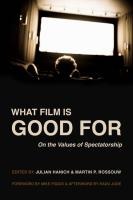"What Film Is Good For is a wonderfully ambitious and timely collection that takes the form, in a sense, of a questionnaire--one that importantly does not seek or need a singular response to the question it asks, as if film could only be good in one way or for one thing, or simply not at all. The diversity of responses collected here is itself a profound lesson in how capacious a moral claim need be if moral it truly is."--Brian Price, author of A Theory of Regret
"Whether one agrees with the writers' propositions, the pleasure of thinking through the claims, pondering these questions of worth, value, profit, loss, the many 'good fors' as well as the occasional 'not good for, ' is a good, indeed, an excellence in itself, opening to a vast and valuable conversation."--Janet Staiger, author of Interpreting Films: Studies in the Historical Reception of American Cinema and Perverse Spectators: The Practices of Film Reception
"Their volume bookended by two marvelous pieces by filmmakers (Mike Figgis and Radu Jude), Julian Hanich and Martin Rossouw have assembled a peerless group of contributors to explore a wide range of compelling questions about film ethics and the value(s) of spectatorship. The result is a foundational volume for Screen Studies."--Catherine Grant, founding author of Film Studies for Free

